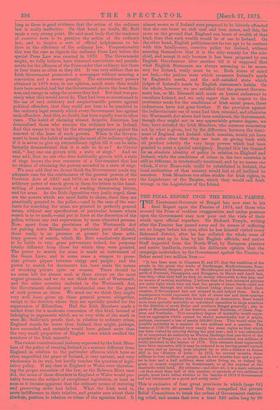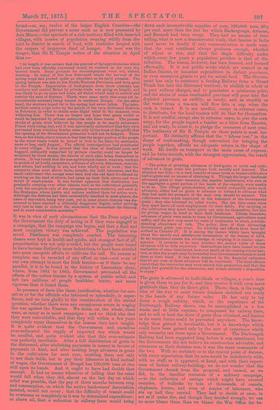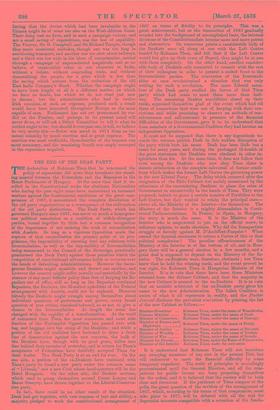cute private piques between clergy and people ; and the
"It has been seen in Chapters H. and IV. that the condition of the power to search for documents has been made the means people in the great rice tracts of Durbhunga, Mudhoobunnee, spite on women. There should b Ram. of wreaking private nugger, Bettiah, Soopool, parts of Mozufferpore and Seetamurhee, and no room left for abuses such as these except on the most parts of Purneah, Dinagepore, and Rungpore, in March and April last,
was this,—that they had no food, no money wherewith to buy any, and
urgent grounds, and we do not think that out of Westmeath, no means of earning anything. I believe that the best-informed persons and the other counties included in the Westmeath Act, are quite right when they say that the people of these tracts could not the Government showed any substantial case for the grant
have come through the crisis without losing about one-third their
of such powers as these. We must say we think they might number, if Government had not stepped in and helped them. Such a consequence would represent the loss of about one and three-quarter very well have given up these general powers altogether, millions of lives. Besides this broad sweep of destruction, there would except in the districts where they are specially needed for the have been sporadic mortality or individual casualties in large numbers suppression of Ribandism. Had the Irish Members made a in the districts of north Behar and northern Bengal generally ; also in united front for a moderate stead of parts of Moorshedabad, of the districts round Burdwan, of Chota Nag- pore, and Sonthalia. This secondary degree of mortality would repro- indulging in arguments which are sti very wide of the mark as sent an aggregate which cannot be stated numerically, but it might, were Mr. Sullivan's proofs that, in relation to ordinary crime, perhaps, represent a loss of nearly 500.000 lives. This would raise the England stands far worse than Ireland, they might, perhaps, possible mortality to a number of two millions and a quarter. The
famine of 1769-70 afflicted very nearly the same region as that which has been visited by scarcity during the past year ; and it was estimated
the very small proportion of English votes which swelled the by so competent an authority as Warren Hastings that one-third of the numbers of the Irish minority, population of Bengal (or, as it has since been calculated, ten millions of
souls) perished in the famine of 1770. This estimate must apparently have been excessive, still it may be referred to as having passed current
England in relation to the particular offences which have so mill in his 'History of India.' In 1874, for several months, three often imperilled the peace of Ireland, is very natural, and very millions to four millions of people, and in two months four and a quer- wholesome in its way, but hardly touches the question of leg's- ter to four and a half millions, were either living on, or helped by, grain or money supplied by Government, or at the expense of the lative policy. If any class in England or Wales were threaten- charitable relief fund. My estimate—and after all, it is a mere estimate ing the proper execution of the law, as the Rebecca Riots once —is that more than half of this number' or upwards of two millions of did, the scene of these disorders in England or Wales would pro- people, must have fallen victims to the famine of 1874 if Government ilocui as it became apparent that the ordinary means of restoring This is exclusive of four great provinces in which (page 64) and preserving order had failed. What the Irish need is, the people were so pressed that they compelled the private more indifference to their relative, and greater care about their Relief Committees to break the orders of Government restrict- 6bsolute, position in relation to crime of the agrarian kind. It ing relief, and means that over a tract 320 'miles long by 90
broad—or, say, twelve of the larger English Counties—the Government did prevent a scene such as is now presented by Asia Minor,—the spectacle of a rich territory filled with deserted villages, with masses of population swaying wildly from dis- trict to district in search of food, with roadsides heaped with the corpses of taxpayers dead of hunger. So near was the danger, that Sir R. Temple ,writes of the situation in April thus :—
" At length it was certain that the gravest of the apprehensions which had ever been officially expressed would be realised in the very die- tressed tracts. Some grounds for encouragement were not, indeed, wanting. In Many Of the less distressed tracts the harvest • of the spring crops had proved quite as abundant as its early promise.. The spring harvest was fair in the North-western-Provinces, and verYlicood in the Punjab,. Importation .of food-grains, from these quarters into southern and central Behar by priyate trade W.111s. going on largely, and was likely to -go in more and More, all 'Which would tend to narroviend restrict the area ofdistress. -There Were some early rice-crops (of in- considerable amount) being reaped in -northern Bengal. On the other hand, the shower hoped for in the spring had never fallen. The inter- mediate-coarse .crope, sewn by the people of the very distressed districts in February, in order to 'obtain sotiterdight relief in the 'Summer, were withering fast: There *as 'no longer any hope that- grain would' or could be imported by private enterprise into these tracts. The private stocks of grain wore believed by ther people to be nearly exhausted. Prices were risingfast, and it was universally understood that they were prevented from reaching famine rates only by the trust of the public that the opening of the Government granaries would not be delayed. There was, on the whole, every reason to fear that the larger portion of the people in the worst traeta would be forced to look to the State for assistance, more or less, until August. The official investigations had penetrated to every village. It wag, proved that the class of destitute peer,' and beggars, onlinarily -supported by --private charity; could no longer be sustained by these means, the donors of such alms being themselves in atraits,, It was found that the non-agricultural classes, weaver; workers in metals of all kinds, carpenters, artiz.a.ns of all sorts, fishermen, menials; and others, had nothing to eat, and were wholly Out 'of work ; that the extensive class next above these, namely, the field labOurers, and•the small cultivators who occupy-Homeland and elts-olt their livelihood:by working on the laud of :others, had eaten up their little stores and -neve bereft of employment. It was further apparent that destitution was gradually creeping over other classes, such as the cultivators generally (with the exception only of the occupancy tenure-holders), and such as the Brahmins, whose habits and notions unfitted them for active work. Although the dietresehad been suceessfally checked; in moat-lacer; the cases of atarvation.being very rare, yet in some places distress we, idle-, covered to have reached a.: critically . dangerous degree, relief arrivitig only just in time to restore the emaciated, tO resuscitate the fainting,
and to avert considerable mortality." • -
• It was in view of such circumstances that the Press urged on the Government the duty of acting as if they were engaged in
a campaign, that the campaign was begun' and that a final and most complete victory, was achieved. The population was saved. Pestilence was conwletely averted. The labouring classes were kept in health and spirits, and strangest fact of all, pauperisation was not only avoided, but the people were found to have become distinctly more industrious, to have been startled into more energetic efforts to cultivate the soil. No success so complete can be recorded of any effort so vast—not even of our own attempt to meet the Irish famine—or if there be any parallel, it is to be found in the history of Lancashire alone, where, from 1861 to 1865, Government prevented all the effects of the cotton' famine by a system of public relief, and left two millions of people healthier; better, and more vigorous than itiound them.
In presence of facts like these, justification, whether for our- selves or for the officials who laboured so spleadidly, is super- fluous, and we turn gladly to the consideration Of the second question, whether there were any conspicuous errors in waging the war against the Famine. We think, on the whole, there were, as many as in most campaigns ; and we think also that they were unavoidable,, and that they will within -a few years completely repay themselves in the lessons they have taught. It is quite evident that the Government and ourselves over-estimated the supply of imported rice which would be needful, and .quite evident also that this over-estimate was perfectly inevitable. After-a full distribution of grain to the distressed, after abolishing payments in money in favour of payments in kind, and after making large advances in grain to the cultivators for next year, enabling them not only to sow their fields, but to pay their labourers in kind instead of -wages, the Government of Bengal has 100,000 tons of rice still upon its hands. And it ought to have had double that amount. It had no means whatever of telling that the rains would fall when they did, almost on the last day on which relief was possible, that the gap of three months between crop and consumption, on which the native landowners' Association insisted, would not occur ; that the difficulty of transit could be overcome so completely as it was by determined expenditure; or above all, that a reduction in railway fares would bring down such inconceivable supplies of corn, 590,000 tons fifty per cent. more than the rice for which Backergunge, ArLcan, and Burmah had been swept. They. had no means of fore- telling, what is now a demonstrated truth, that famine in India need never be deadly if only communication is made easy, that the vast continent always produces enough, whether of wheat or rice, and that the single difficulty under which every few years a population perishes is that of dis- tribution. The lesson, however, has been learned, and learned effectually. It is not public works which are wanted in an Indian famine, or immense expenditure in distant provinces, or even enormous grants to pay for actual food. The Govern- ment has only to construct a feeding Railway from a Grand Trunk line into the distressed territory, to abolish in whole or in- part' railway charges, and to guarantee a minimum price, and the stores of some overloaded province will pour into the depleted province, as swiftly, as surely, and as steadily as the water from a tea-urn will flow into a cup when the cock is turned. n is not needful, except in extreme cases, to distribute, for the local traders will do that for themselves. It is not needful, except also in extreme cases, to give the corn away, for the people regard a famine as a blow from Heaven? and are ready, to avert it, to pledge the resources of next year. The testimony of Sir R. Temple on these points is most im- portant. He distinctly affirms that the "labour test," in the shape of road-making, though convenient for bringing the people together, affords no adequate return in the shape of work. He dwells on transport as the main cause of expense, and he twice records, with the strongest appreciation, the result of advances in grain.
The policy of granting advances of food-grain to ryots and culti- vators on a large scale has perhaps both novelty and interest. The situation was this,—in a vast number of cases ryas or tenant-cultivators had no grain and no means of obtaining it. Though the larger landlords advanced grain to their tenantry, the smaller landowners, who own in the aggregate a great portion of the lands of the country, were unable to do so. The village grain-dealers, who would ordinarily make such advances, either had no grain to advance or refused to advance what they had until the prospect of the next crop should be Assured. The cultivators were much employed in the transport of the Government grain ; they also laboured on relief works. But the time came when they must leave all such, employment for their gelds. For carrying on the cultivation they must have grain not only for themselves, but also for giving wages in kind to their field labourers. 'Unless, therefore, adyanoes of grain were made to them by Government, agriculture must suffer, and. the now crop must for want of husbandry be short, notwitht standing abundance of rain. The policy, then, of thus advancing Government grain was clear. Its working and effects have been de- scribed in Chapter IV. It is among the causes which have brought about the speedy and satisfactory termination of the famine of 1874. So far experience attests the advantage of adopting it in similar emer- gencies. It remains to be seen whether the money value of these advances will be duly recovered. Instructions have been issued for the realisation of some instalment, however small, at the coming winter har- vest, so that the people may be reminded that Government intends to hold them to their bond. It has been assumed in the financial estimates that 85 per cent, of these advances will be recovered. The local officers report that the recoveries may even exceed this proportion, and that the people feel grateful for the concession, and evince entirely a disposition to repay."
The grain is advanced to individuals or villages, a year's time is given them to pay for it, and they receive it with even more gratitude than they do direct gifts. There, then, is the rough idea of the way to meet future famines sketched out ready to the hands of any future ruler. He has only to lay down a rough railway, which, as the experience of the Durbungah Railway shows, can be accomplished in a few weeks and at little expense, to compound for railway fares, and to sell or lend the store of grain thus obtained, and famine in its worst forms could be prevented anywhere. The know- ledge thus gained is invaluable, but it is knowledge which could have been gained only by the sort of experience which only necessity can force upon a Government. The Durbungah Railway had been suggested long before it was sanctioned, but the Government did not believe its construction advisable, and erroneous as their decision was, it was the more reasonable of the two. With no certainty as to the central point of distress, with every expectation that its area would be indefinitely wide, with no staff, as it appeared, at hand, and with their experi- ence of Indian railway-building, we do not wonder that the Government shrank from the proposal, and turned, as we did, to the familiar resources of a military campaign, —to the collection of cartage which might have covered counties, of bullocks by tens of thousands, of camels, elephants, horses, and even of armies of labourers, who ate up half they carried. They had to decide at once, to act as if under fire, and though they decided wrongly, we can no more blame them than we blame the War Office for be- Roving that the device which had been invaluable in the Crimea might be of some use also on the West-African Coast. "Their delay cost no lives, and in such a campaign victory, and not a small saving of expenditure, was the test of capability. The Viceroy, Sir G. Campbell, and Sir Richard Temple, though they made occasional mistakes, though one was too long in _sanctioning transport, and another was too slow about railways, and a third was too wide in his ideas oT commissariat, carried through a campaign of unprecedented magnitude, and as we believe, of incalculable value to our character in India, without a failure, without suspending trade, and without
• demoralising the people, for a price which is less than the saving which accrues from the extinction of the old East India Company's Stock. Whether the campaign ought to have been fought at all is a different matter, on which we have no doubt, but which we do not want just now to discuss ; but the administrators who had in twelve Irish counties, at such an expense, produced such a result would have been honoured throughout Europe as the most capable of men. Parliament has not yet pronounced its ver- dict on the Famine, and perhaps in its present mood will never -do so, or will ask a Select Committee to tell it what its verdict ought to be; but should it ever pass one, it will, we believe be very nearly this :—Behar was saved in 1874 from an im- mense calamity by much exertion and at great expense. The -exertion was most creditable, three-fourths of the expense was 1nost necessary,, and the remaining fourth was amply recouped in the experience acquired.




































 Previous page
Previous page